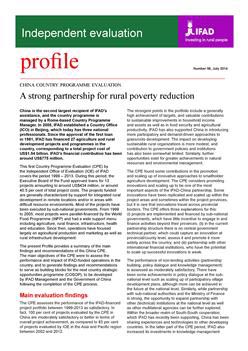Evaluation shows IFAD-China partnership mutually beneficial - IOE
Evaluation shows IFAD-China partnership mutually beneficial
Beijing, 18 July 2014 – Development projects in China supported by the International Fund for Agricultural Development (IFAD) between 1999 and 2013 were generally successful in reaching their targets for household income, food security and agricultural productivity, according to the country programme evaluation presented yesterday in Beijing.
During the period 1999 - 2013, IFAD's Executive Board approved loans for 13 projects amounting to around US$434 million, or around 40.5 per cent of total project costs. Each of the projects was designed to support integrated rural development in remote locations or in areas with few resources. Since 2005, operations have focused largely on agricultural production and marketing as well as rural infrastructure development.
The evaluation concluded that the IFAD-China partnership is mutually beneficial. Although the per capita income in the country has risen, around 150 million rural people still live on less than US$1.25 per day. Income inequality persists and market reforms need to be intensified further.
"The China-IFAD partnership should continue to be strengthened and carefully adjusted to correspond to the dynamic social-economic developments of the country," says Kees Tuinenburg, Interim Director of the Independent Office of Evaluation.
John McIntire, Associate Vice President of Programmes at IFAD adds, "the findings in this evaluation are significant because they illustrate the impact that well-designed projects can have in improving the livelihoods of poor rural people in China."
The evaluation findings and recommendations were presented and discussed during a national round-table workshop on the evaluation of IFAD's country programme in China. The workshop was co-organized by the Ministry of Finance of the People's Republic of China and the Independent Office of Evaluation of IFAD (IOE). The event focused on the main findings and recommendations that emerged from the evaluation; which include high success in reaching target achievements, valuable contributions to sustainable improvements in household income and assets as well as in food security and agricultural productivity. IFAD has also supported China in introducing more participatory and demand-driven approaches to grassroots development.
The evaluation underlined that more resources must be allocated to enhancing non-lending activities (knowledge management, policy dialogue and partnerships) as well as to South-South and triangular cooperation.
China is the second largest recipient of IFAD's assistance. Since the approval of the first loan in 1981, IFAD has financed 27 agriculture and rural development projects and programmes in the country, corresponding to a total project cost of US$1.94 billion. IFAD's financial contribution has been around US$775 million.
The full evaluation report will be released in September 2014.
Press release No.: IFAD/45/2014
The International Fund for Agricultural Development (IFAD) invests in rural people, empowering them to reduce poverty, increase food security, improve nutrition and strengthen resilience. Since 1978, we have provided about US$15.8 billion in grants and low-interest loans to projects that have reached some 430 million people. IFAD is an international financial institution and a specialized United Nations agency based in Rome – the UN's food and agriculture hub.
The Independent Office of Evaluation (IOE) conducts evaluations of IFAD-financed policies, strategies and operations to promote accountability and learning. The main purpose is to contribute to improving IFAD's and its partners' performance in reducing rural poverty in recipient countries. IOE's independent evaluations assess the impact of IFAD-funded activities and give an analysis of successes and shortcomings – to tell it the way it is – as well as identify factors affecting performance. Based on the key insights and recommendations drawn from evaluation findings, IOE also communicates and shares IFAD's knowledge and experience in agriculture and rural development with a wider audience.
